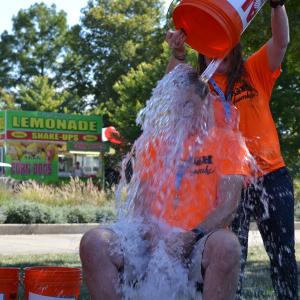Of the more than 31,000 people living with ALS in the United States, about 90–95% have the “sporadic” form of the disease, meaning they are likely the first in their families to be diagnosed. The other 5–10% of people living with ALS have family members who have also been affected by the disease, making it probable that genetics are involved.
We know that better understanding the genetics of ALS will help make it easier to identify those at risk and ultimately prevent new cases of ALS altogether.

Before the Ice Bucket Challenge, gene discovery was slow and incremental, and there were no gene therapies available for people diagnosed with ALS. Since the Challenge, more than 12 new genes have been discovered, bringing the total number of genes known to have a connection to ALS to more than 40, and the first treatment for a genetic form of the disease was approved.
“Funding from the Ice Bucket Challenge was also committed for testing of genetic therapies,” says Dr. Kuldip Dave, senior vice president of research at the ALS Association. “If you know that you have genes that are increasing your risk of ALS, you can make therapies that are very specific for correcting that gene. That's what we mean by gene therapy.”
Dr. Dave goes on to explain it’s important to understand genetic therapies are not just for genetic ALS. “We can use gene therapy to go after sporadic ALS because we know that there are certain proteins that are involved in 90% of ALS. And if we can go after those proteins using gene therapy approaches, we can now go and treat all ALS, and not just a particular genetic subtype. And that's the future of gene therapy. How can we use gene therapy to go after the sporadic forms of ALS?”

More genetic testing and counseling will help identify more people living with the disease who could benefit from gene therapies; people like Larry Falivena.
In August 2017, Larry heard those three terrible words: “You have ALS.” Like most who experience the lengthy diagnosis process, Larry suspected that was the case, but actually, hearing it from his doctor was devastating. A husband and father of two young boys, he had so many plans for the future, or so he thought.
After his diagnosis, Larry was encouraged to get a genetic test even though he had no known family history of ALS, and he says making that decision changed the course of his disease—and his life. Sure enough, a SOD1 mutation was found, a known genetic cause for the disease.
Larry was able to get into an ongoing clinical trial for a treatment of SOD1-ALS called tofersen, now known as Qalsody.
Ensuring greater access to genetic testing and counseling is also a key component of reducing the time it takes to diagnose someone with ALS, giving them more time to access treatments and enroll in clinical trials. Families given the chance to understand their genetic background can also help them make decisions about family planning and can provide a sense of relief from uncertainty and an opportunity to plan for the future.
But currently, genetic testing can have significant drawbacks, especially for people with a family history of the disease but no ALS symptoms. That’s why we need the government to put protections in place to safeguard against discrimination based on genetic information. As states continue to pass legislation like the Genetic Testing Protection Act, people will have less fear of discrimination by life, long-term care, or disability insurers, which will remove a major barrier for those who want to get tested.
By increasing participation in genetic testing and counseling, we can equip families impacted by ALS with more information and provide larger data pools for research and discovery.
“So much research in really all the medical fields is going towards genetics because it's something we can identify, we can understand, and now we actually have the ability to affect,” Larry said.
But, despite the progress being made in the area of genetics and ALS, much more work needs to be done.
We still need more genetic testing and counseling.
We still need a cure.
Let's See It End.

Dr. Dave will be sharing more about the work we are doing to find new treatments and cures for ALS at ALS Nexus, a conference featuring a variety of sessions that focus on the latest developments and opportunities in research, care, and advocacy.
To learn more about the research we fund, visit our website HERE. And to continue to follow the latest ALS research news, sign up for our monthly newsletter, Research Matters.
To continue to follow stories about people living with ALS in the community and learn more about the disease, subscribe to receive our weekly blogs in your inbox HERE or follow us at als.org/blog.


Join the conversation. Please comment below.